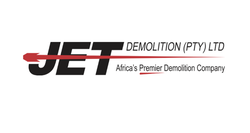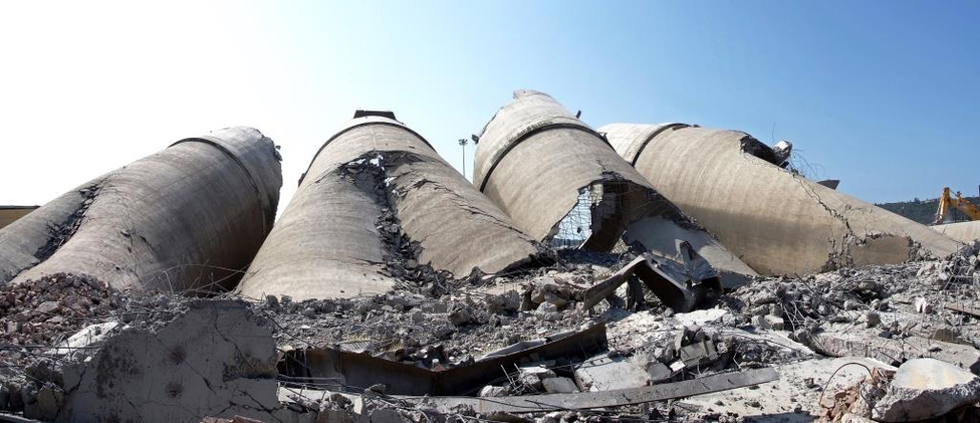Decades of experience allows Jet Demolition to offer the best solutions
| Decades of experience allows Jet Demolition to offer the best solutions_approved | 64.5 KB | Download | |
| Large-scale commercial demolition within an urban environment | 3.44 MB | Download | |
| Confined space demolition within live facilities | 3.29 MB | Download | |
| Controlled implosion of a tall commercial building | 649.06 KB | Download | |
| Heavy industrial demolition often requires specialised equipment | 4.7 MB | Download | |
| Overnight rapid bridge demolition over live roadways | 807.09 KB | Download | |
| Jet Demolition Contracts Manager Kate Bester | 395.02 KB | Download |
When considering the demolition of a tall building, for example, top-down mechanical demolition is comparable with implosion. Both are sound techniques, but are restricted by the environment in which the demolition is to take place.
If there is sufficient space and time available, implosion might be the better option, whereas a very restricted or operational environment might result in high-reach demolition being more effective and better suited to the structure itself.
There is no firm guideline to select a demolition method. Instead, the application of years of experience, together with careful consideration of both the project and the environment, as well as client requirements and preferences, are all weighed and compared to select the most appropriate solution.
“The demolition professional’s arsenal of techniques and methods also permit hybrid solutions to come to the fore, often combining individual methods into unique, site-specific applications,” Jet Demolition Contracts Manager Kate Bester (N. Dip. Civil Engineering) comments.
While Jet Demolition can undertake most types of demolition work, its preference is generally for a mechanical application as a ‘best possible’ approach. This is in accordance with international best practice principles of separating workers from risk.
Thus Jet Demolition has an extensive equipment fleet, giving it the flexibility to draw from within its own reserves to suit the method selected. Plant is kept in top condition by an in-house team of mechanics, and is generally traded in at 6 000 hours, which is much sooner than typical in the construction industry. Thus plant is ready, in good working order and always available for the next project.
Some projects, however, do not lend themselves to mechanical demolition, and require more conventional pre-cutting and preparation of structures for controlled toppling. “Our employee pool consists of permanent, full-time employees with extensive experience, ensuring that when more conventional projects arise, these can be completed safely,” Bester explains.
“There is no single course that a person can take to become skilled in demolition. In our industry, experience is paramount. Our personnel undertake regular training and certification in their areas of experience, but the true strength of the company lies in the skills of our personnel.”
In the South African context, it is not unusual to be tasked with the demolition of a structure for which as-built drawings and records do not even exist. In such instances, upfront planning and preparation for such structures involves intensive and in-depth examination. This often means reverse-engineering structural assessments derived from the initial investigation to best assess the primary characteristics and stability of such structures.
The information is then used to verify whether the anticipated methods are appropriate, and to anticipate the structure’s response. While modelling software is available internationally that is capable of determining to some degree how a structure will react, Jet Demolition instead relies on its own unique experience and expertise.
This is essential given that the South African demolition industry is not as regulated as in some other countries. A large number of companies are carrying out demolition activities without the relevant experience or due diligence that such projects require.
“It is not uncommon for a building contractor to also undertake demolition work – sometimes successfully, but at other times with disastrous consequences. It is up to clients to determine whether the demolition service provider is bona fide, and has the appropriate tools, equipment and skill to be able to undertake large-scale demolition projects,” Bester points out.
“Fortunately, we do see a change in the industry whereby due diligence audits and assessments are being undertaken prior to contracts being awarded. This is encouraging, and will lead to a stronger and more accountable industry at large.”
Allied to this is the fact that demolition technology is advancing globally, which is having a positive impact on the local industry. While demolition robots and remote demolition have been available for many years, there are limitations to the technology. For example, Jet Demolition has remote-control units that can be fitted to its plant.
This type of technology is used specifically where there is a risk of soil subsidence during sinkhole remediation. The machine operator is able to control the machine from a distance. However, there is a definite compromise on precision and reactivity.
“For the most part, being able to read and assess a structure’s behaviour is paramount to the safety of the team, which is very difficult to do from a distance. For this reason, our use of remote-demolition practices is very restricted,” Bester elaborates.
Jet Demolition also assists its clients with pre-closure planning, and regularly undertakes demolition closure assessments and programmes to assist clients in planning their end-of-life activities while the plant is still operational. “We also assist with up-front demolition planning, demolition execution and full site rehabilitation as required,” Bester explains.
“Our attention to detail and our approach to demolition is what sets us apart. Our main concern is for the safety of people. Our methods, resources and approach are all aligned exactly to serve this purpose. We have been in business since 1994, and have kept our focus on this one primary objective: Completing the project safely, on time and to international standards,” Bester stresses.
An extensive range of environmental and regulatory requirements apply to demolition projects, in addition to specific client requirements. Jet Demolition is accredited in terms of the following safety, health, environmental and quality standards: CMB253 NOSA Integrated HSE System, NOSA NOSCAR Safety Performance Level, ISO 45001:2018 Occupational Health & Safety Management System and ISO 9001:2015 Quality Management System.
Ends
Connect with Jet Demolition on Social Media to receive the company’s latest news
Facebook: https://www.facebook.com/JetDemolition/?ref=br_rs
LinkedIn: https://www.linkedin.com/company/jet-demolition-pty-ltd/
Notes to the Editor
To download hi-res images for this release, please visit http://media.ngage.co.za and click the Jet Demolition link to view the company’s press office.
About Jet Demolition
Jet Demolition has been undertaking industrial demolition works since 1994, and is the leading, largest, and most technically-advanced demolition company in Africa. It offers in-house, full-range demolition services, including advanced mechanical solutions and controlled implosions. It actively pursues ongoing development of skills and equipment suited to the changing needs of the industry.
Jet Demolition is a technically-based company, with various staff members holding MSc, BSc, and BTech Degrees, as well as National Diplomas, in various engineering fields. This expertise gives it the technical foundation to successfully engineer solutions for large and complex demolition projects, and furthermore fuels its drive to deliver quality projects safely. Jet Demolition strives to offer its clients innovative and technical solutions to demanding demolition challenges.
Jet Demolition Contact
Kate Bester (NDip Civil Engineering)
Contracts Manager
Phone: (011) 495 3800
Email: kate [at] jetdemolition [dot] co [dot] za
Media Contact
Renay Tandy
NGAGE Public Relations
Phone: (011) 867 7763
Fax: 086 512 3352
Cell: 082 562 5088
Email: renay [at] ngage [dot] co [dot] za
Web: www.ngage.co.za
Browse the NGAGE Media Zone for more client press releases and photographs at http://media.ngage.co.za

